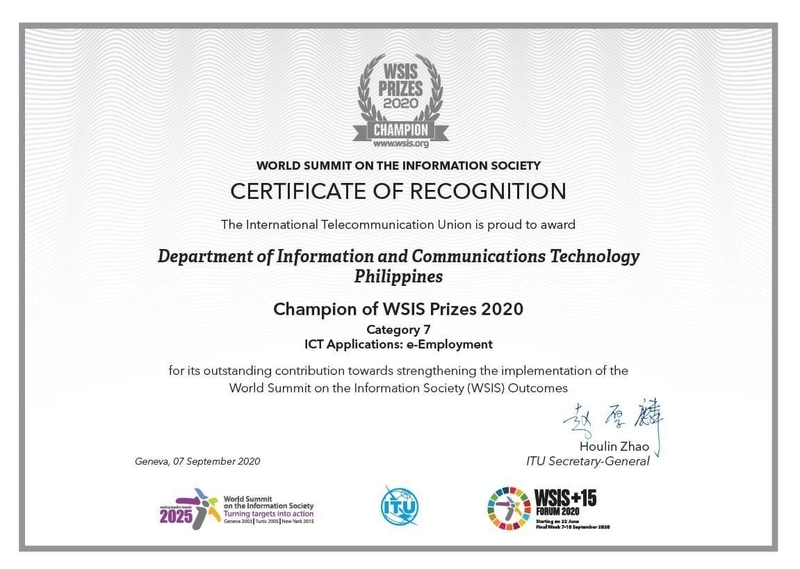
The Department of Information and Communications Technology’s Digital Hub in Zamboanga City recently bagged the champion prize for the e-employment category of the World Summit on the Information Society (WSIS) 2020. The hub was selected as one of 72 champion entries out of over 800 competitors from around the globe.
According to a press release, the award was given to DICT’s Mindanao Cluster 1 (MC1) Digital Hub, which serves as a learning, innovation, and co-working space facility and is open to the public round-the-clock. The Field Operations Office of DICT MC1 covers the Basilan, Sulu, Tawi-tawi, and the Zamboanga Peninsula, where the hub is located.
The digital hub project team was instrumental in this achievement for MC1, with Hub Manager Lanie Maturan at the helm, Dario Avergonzado as the Trainer, and Angel Chua as Communications Officer, the release noted. The hub aims to achieve three main goals:
- Provide access to ICT resources and opportunities
- Provide training on ICT skills
- Provide a facility for digital workers
Director Maria Teresa M. Camba stated that through the champion project, the department was able to equip thousands with ICT skills to land online jobs wherever they are, even at home. The department’s efforts to empower the countryside with digital skills are reaping huge benefits, especially now that it is more advantageous to work from home.
In 2019, the hub served over 2,500 users and trained more than 700 users with digital skills training since its creation. The facility likewise allows freelance workers to earn a collective sum of PH₱ 1.5 million (US$ 30,983) per month to uplift the local economy.
The Digital Hub is the only entry from the Philippines awarded as champion, after successfully passing the stages from nominations for the shortlist and the final voting process. “We are proud of this achievement and are pleased that our solutions had been recognised by industry leaders, practitioners, and peers as a viable ICT solution for sustainable development. We promise to live up to the expectations of the global community to develop and implement smarter solutions as we hone the benefits of the digital economy for our citizens,” the DICT Secretary, Gregorio B. Honasan II, said.
The country has announced its plan to go completely digital through its Full Digital Transformation Act of 2020, which mandates all government agencies, government-owned and controlled corporations (GOCCs), instrumentalities, and local government units (LGUs) to adopt a digital plan that aligns with the Philippine Digital Transformation Strategy 2022.
OpenGov Asia reported that the bill promotes a zero-contact policy and facilitates the ease of procedures. It is meant to streamline government services in accordance with the Ease of Doing Business and Efficient Government Service Delivery Act of 2018, the Energy Virtual One-Stop Shop Act, and several other related laws. Further, the e-Gov Master Pan and the related e-Gov and Integrated Government Philippines (iGovPhil) programs have been launched to integrate digital technologies and improve the delivery of services.
As the country deals with the COVID-19 pandemic, the need for digital transformation in governance is urgent. Contract tracing and the distribution of aid would be more efficient if data were harmonised and digital systems put in place more comprehensively, which is what the proposed bill aims to do.
















